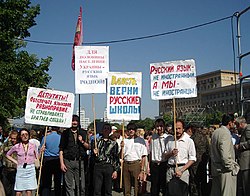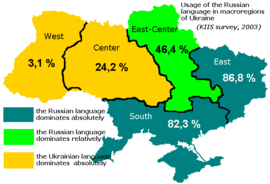Russian language in Ukraine: Difference between revisions
→Polls: one poll, or more ? |
No edit summary |
||
| Line 1: | Line 1: | ||
{{POV}} |
|||
[[Image:Meeting in Kharkov.jpg|thumb|right|250px|People supporting the decision of the Kharkiv City Council to make the Russian language official on the local level.]] |
[[Image:Meeting in Kharkov.jpg|thumb|right|250px|People supporting the decision of the Kharkiv City Council to make the Russian language official on the local level.]] |
||
Revision as of 17:57, 15 May 2007
The neutrality of this article is disputed. |

The Russian language is the most common first language in Eastern and Southern Ukraine and Kiev, the country's capital, and the most widespread second language throughout the country.
Distribution
2001 Census


According to official data from the 2001 Ukrainian census, the Russian language is native for over 14,273,000 Ukrainian citizens (29.3 % of the total population).[1] Ethnic Russians form 56% of the total Russian-speaking population, while the remaining Russophones are people of other ethnic background: 5,545,000 Ukrainians, 172,000 Belarusians, 86,000 Jews, 81,000 Greeks, 62,000 Bulgarians, 46,000 Moldavians, 43,000 Tartars, 43,000 Armenians, 22,000 Poles, 21,000 Germans, 15,000 Crimean Tartars.
Therefore, the Russian-speaking population of Ukraine forms the largest linguistic community in Europe that does not have official status for its language. Furthermore, the Russian-speaking population of Ukraine constitutes the largest Russophone community outside the Russian Federation.
Polls
According to a public opinion poll, the Russian language is used far more than was claimed by the official census. A survey by the Kiev International Sociology Institute (2004) showed that Russian is used at home by 43–46% of the population (in other words the same or a slightly larger proportion than the Ukrainian-speaking population). According to this survey, Russophones form the majority of the population in all Eastern and Southern regions of Ukraine:[2]
- Autonomous Republic of Crimea — 97% of the population
- Dnipropetrovsk Oblast — 72%
- Donetsk Oblast — 93%
- Zaporizhia Oblast — 81%
- Luhansk Oblast — 89%
- Mykolaiv Oblast — 66%
- Odessa Oblast — 85%
- Kharkiv Oblast — 74%
The Russian language dominates in informal communication in the capital of Ukraine, Kiev.[3] [4] It is also used by a sizeable linguistic minority (4-5% of the total population) in Central and Western Ukraine.[5]
According to data obtained by the "Public opinion" foundation (2002), the population of the oblast centers prefer to use Russian (75%).[6] Continuous Russian liguistic areas occupy certain regions of Crimea, Donbass, Slovozhanschina, southern parts of Odessa and Zaporizhia oblasts, while Russian linguistic enclaves exist in central Ukraine and Bukovina.
| 1994 | 1995 | 1996 | 1997 | 1998 | 1999 | 2000 | 2001 | 2002 | 2003 | 2004 | 2005 | |
|---|---|---|---|---|---|---|---|---|---|---|---|---|
| Russian language | 34.7 | 37.8 | 36.1 | 35.1 | 36.5 | 36.1 | 35.1 | 38.1 | 34.5 | 38.1 | 35.7 | 34.1 |
| 1994 | 1995 | 1996 | 1997 | 1998 | 1999 | 2000 | 2001 | 2002 | 2003 | 2004 | 2005 | |
|---|---|---|---|---|---|---|---|---|---|---|---|---|
| Mainly Russian | 32.4 | 32.8 | 33.1 | 34.5 | 33.4 | 33.6 | 36.0 | 36.7 | 33.2 | 36.0 | 34.3 | 36.4 |
| Both Russian and Ukrainian | 29.4 | 34.5 | 29.6 | 26.8 | 28.4 | 29.0 | 24.8 | 25.8 | 28.0 | 25.2 | 26.3 | 21.6 |
Russian language in Ukrainian politics
| 1995 | 1996 | 1997 | 1998 | 1999 | 2000 | 2001 | 2002 | 2003 | 2004 | 2005 | |
|---|---|---|---|---|---|---|---|---|---|---|---|
| Yes | 52.0 | 50.9 | 43.9 | 47.6 | 46.7 | 44.0 | 47.4 | 48.6 | 47.3 | 47.5 | 48.6 |
| Hard to say | 15.3 | 16.1 | 20.6 | 15.3 | 18.1 | 19.3 | 16.2 | 20.0 | 20.4 | 20.0 | 16.8 |
| No | 32.6 | 32.9 | 35.5 | 37.0 | 35.1 | 36.2 | 36.0 | 31.1 | 31.9 | 32.2 | 34.4 |
| No answer | 0.1 | 0.0 | 0.1 | 0.1 | 0.1 | 0.5 | 0.4 | 0.3 | 0.3 | 0.3 | 0.1 |

According to the Constitution of Ukraine,[10] adopted by the parliament, Ukrainian is the sole language to be given the status of official state language in the country while the other languages spoken in Ukraine are also guaranteed constitutional protection. Even though Russian is the only language explicitly mentioned in Article 10 of the constitution among the languages other than Ukrainian to be given state protection,[11]
Although officially the Russian-speaking population is about 30 % (2001 census) 39 % of the Ukrainian citizens think that the rights of the Russophones are violated because the Russian language is not official in the country, whereas 38 % of the citizens have the opposite position (2006, survey).[12] [13]
The issue of Russian receiving status of second official language has been a subject of extended controversial discussion ever since Ukraine became independent in 1991. In every Ukrainian election, many politicians, such as Leonid Kuchma, used their promise of making Russian a second state language to win support. The current Prime Minister, Viktor Yanukovych, has continued this practice. Current president Viktor Yushchenko, during his 2004 campaign, also claimed a willingness to introduce more equality for Russian speakers. His clipping service spread an announcement of his promise to make Russian language proficiency obligatory for officials who interact with Russian-speaking citizens.[14] In 2005 Yuschenko stated that he had never signed this decree project.[15]
The controversy is seen as a deliberate policy of Ukrainization. For example, the amount of Russian-teaching schools has been systematically reduced since 1991 and now it is much lower than the proportion of Russophones. The reduction of Russian television broadcasts and the recent decision to dub rather than subtitle Russian programmes on Ukrainian channels have also added to the controversy.
In 2006 the Kharkiv City Rada was the first to declare Russian to be official at the local level. Following that, almost all southern and eastern oblasts (Lugansk, Donetsk, Mykolaiv, Kharkiv, Zaporizhia, and Kherson oblasts), and major cities (Sevastopol, Dnipropetrovsk, Donetsk, Yalta, Luhansk, Zaporizhia, Kryvyi Rih, Odessa) followed suit. Despite the appeal of President Viktor Yushchenko, only a few courts have cancelled these decisions.[16] According to survey by "Research and Branding group" (June, 2006) the majority of Ukrainian citizens supported the decisions of local authorities: 52 % largely supported (including 69 % of population of eastern oblasts and 56 % of southern regions), 34 % largely did not support the decisions, 9 % - answered "partially support and partially not", 5 % had no opinion. [17]
Russophone community
Over the course of the 20th century, if not during the whole period of Imperial Russian rule in Ukraine, the ever-changing policies of Ukrainization and Russification have created a society that lives in south-eastern Ukraine that is thought to be neither wholly Russian nor Ukrainian.
Potentially this could cause Ukraine serious problems, and the official reasoning of those who reject making Russian official is that such a move would force Ukraine to slowly gravitate back to Russia, or, on a regional level, threaten its territorial integrity at a time of crisis.

However, some, like the French researcher Dominique Arel, hold a different opinion on the matter. Despite the ethnic mixing that took place ever since the land was settled in the 19th century by colonisers from other regions of the Empire, the people there do not share the same Ukrainian mentality as those in the central and western regions, and thus many feel alienated by Kiev's pro-Western Ukrainian orientation. Arel thinks that if Russian were to be raised to the level of state language, this alienation would promptly end, and the people would cease to feel like second-class citizens and realise that they hold equal importance in Ukrainian politics as those from the central and western regions.[18]
A Ukranian historian, Viktor Horodyanenko, states that "The Russian-speaking socio-cultural community is characterized by informal integrity; it appears as an independent subject in social behavior. The basic system-formative characteristics are ethnicity (there are 11,000,000 Russians in Ukraine), residence (Russophones live in the industrial cities of Eastern and Southern Ukraine), intactness of the native language among Russians, firm ties of the Russians in Ukraine with the maternal ethnic group, largely intact national traditions and Russian spiritual culture, and adherence to a single faith (Orthodoxy). For the time being, the Russian-speaking citizens do not aspire to separatism, have faith in democratic reforms, but preserve their distinctive mentality and social behaviour"[19]
Bibliography
- Русские говоры Сумской области. Сумы, 1998. — 160 с ISBN 966-7413-01-2
- Русские говоры на Украине. Киев: Наукова думка, 1982. — 231 с.
- Степанов, Є. М.: Російське мовлення Одеси: Монографія. За редакцією д-ра філол. наук, проф. Ю. О. Карпенка, Одеський національний університет ім. І. І. Мечнікова. Одеса: Астропринт, 2004. — 494 с.
- Фомин А. И. Языковой вопрос в Украине: идеология, право, политика. Монография. Второе издание, дополненное. — Киев: Журнал «Радуга». — 264 с ISBN 966-8325-65-6
- Rebounding Identities: The Politics of Identity in Russia and Ukraine. Edited by Dominique Arel and Blair A. Ruble Copub. The Johns Hopkins University Press, 2006. 384 pages. ISBN 0801885620 and ISBN 9780801885624
- Bilaniuk, Laada. Contested Tongues: Language Politics And Cultural Correction in Ukraine. Cornell University Press, 2005. 256 pages. ISBN 9780801443497
- Laitin, David Dennis. Identity in Formation: The Russian-Speaking Populations in the Near Abroad. Cornell University Press, 1998. 417 pages. ISBN 0801484952
Refrences
- ^ "Results / General results of the census / Linguistic composition of the population". 2001 Ukrainian Census.
{{cite web}}: Unknown parameter|accessmonthday=ignored (help); Unknown parameter|accessyear=ignored (|access-date=suggested) (help) - ^ "Portrait of Yushchenko and Yanukovych electorates". Analitik (in Russian).
{{cite web}}: Unknown parameter|accessmonthday=ignored (help); Unknown parameter|accessyear=ignored (|access-date=suggested) (help) - ^ http://www.ji.lviv.ua/n35texts/masenko-mov_syt.htm
- ^ "Byurkhovetskiy: Klichko - ne sornyak i ne buryan, i emu nuzhno vyrasti". Korrespondent (in Russian).
{{cite web}}: Unknown parameter|accessmonthday=ignored (help); Unknown parameter|accessyear=ignored (|access-date=suggested) (help) - ^ "In Ukraine there are more Russian lanaguage speakers than Ukrainian ones". Evraziyskaya panorama (in Russian).
{{cite web}}: Unknown parameter|accessmonthday=ignored (help); Unknown parameter|accessyear=ignored (|access-date=suggested) (help) - ^ http://www.demoscope.ru/weekly/2002/059/panorama01.php#13
- ^ "Ukrainian society 1994-2005: sociligical monitoring". http://dif.org.ua (in Ukrainian).
{{cite web}}: External link in|work=|accessmonthday=ignored (help); Unknown parameter|accessyear=ignored (|access-date=suggested) (help) - ^ "Ukrainian society 1994-2005: sociligical monitoring". http://dif.org.ua (in Ukrainian).
{{cite web}}: External link in|work=|accessmonthday=ignored (help); Unknown parameter|accessyear=ignored (|access-date=suggested) (help) - ^ "Ukrainian society 1994-2005: sociligical monitoring". http://dif.org.ua (in Ukrainian).
{{cite web}}: External link in|work=|accessmonthday=ignored (help); Unknown parameter|accessyear=ignored (|access-date=suggested) (help) - ^ See highlights in English
- ^ Article 10 of the Constitution says: "The state language of Ukraine is the Ukrainian language. The State ensures the comprehensive development and functioning of the Ukrainian language in all spheres of social life throughout the entire territory of Ukraine. In Ukraine, the free development, use and protection of Russian, and other languages of national minorities of Ukraine, is guaranteed."
- ^ http://www.podrobnosti.ua/society/2006/12/04/373924.html
- ^ http://www.regnum.ru/news/749712.html
- ^ Clipping service of Viktor Yuschenko. "Yuschenko guarantee equal rights for Russian and other minority languages - Decree project". Retrieved April 10.
{{cite web}}: Check date values in:|accessdate=(help); Unknown parameter|accessyear=ignored (|access-date=suggested) (help); Unknown parameter|datepublished=ignored (help) - ^ Lenta.ru. "Yuschenko appealed to Foreign Office to forget Russian language". Retrieved April 10.
{{cite web}}: Check date values in:|accessdate=(help); Unknown parameter|accessyear=ignored (|access-date=suggested) (help); Unknown parameter|datepublished=ignored (help) - ^ "Russian language in Odessa is acnowledged as the second official government language ..." Newsru.com (in Russian).
{{cite web}}: Unknown parameter|accessmonthday=ignored (help); Unknown parameter|accessyear=ignored (|access-date=suggested) (help) - ^ http://www.ura-inform.com/ru/print/politics/2006/07/17/resultati_oproso
- ^ http://krytyka.kiev.ua/articles/s.3_11_2006.html
- ^ http://www.niurr.gov.ua/ukr/dialog_1999/Gorodianenko.html
